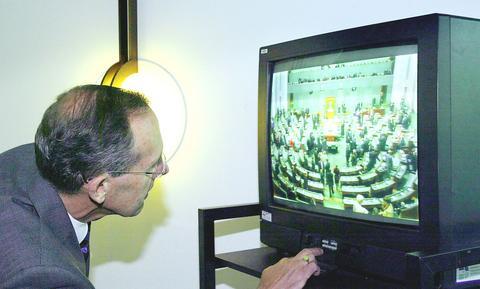Chinese President Hu Jintao (
Hu made his appearance less than 24 hours after US President George W. Bush gave a speech before the special joint session.
Hu pledged to let Australia benefit from his country's explosive economic growth, but hinted that doing business with Beijing also hinged on Canberra respecting China's sovereignty and not commenting on its internal affairs.

PHOTO: REUTERS
Hu and Prime Minister John Howard witnessed the signing by their officials of four separate trade and economic treaties, including a potentially lucrative energy deal for China to invest in liquid natural gas development in Australia.
The main "framework agreement" sets a "road map" for the conduct of trade and economic ties. The leaders also agreed to a preliminary study on a free-trade pact.
Hu became only the fourth foreign leader -- after three US presidents, including Bush on Thursday -- to address the parliament.
He told a special joint sitting that Beijing expected Canberra to play a "constructive role in China's peaceful reunification."
"A peaceful solution to the Taiwan question serves the interest of all the Chinese people ... just as it serves the common interests of all countries in the region, including Australia," he said.
At a joint press conference afterward, Howard reaffirmed Australia's commitment to a "one China" policy that sees Taiwan as part of Chinese territory.
The honor extended to Hu angered some lawmakers.
"The parliamentary address sets a precedent by honoring the head of a totalitarian regime in the elected chamber," said Senator Brian Harradine, an independent lawmaker who boycotted the speech.
In his address, Hu said that Beijing was "ready to be your [Australia's] long-term and stable cooperation partner."
"I am convinced that this framework will help steer our bilateral cooperation in economy, trade and other fields to continuous new highs," he said.
The natural gas deal will see China take a stake in an Australian company to open up new liquid natural gas fields off the west Australian coast. Howard said the deal could be worth even more than a similar contract inked last year that is worth A$25 billion (US$17.5 billion) in exports over the next two decades.
Together, the two gas deals make Australia a key supplier of energy to the world's most populous nation and an economy expected to treble in size over the next 20 years.
Hu emphasized it was important for both countries to "respect each other's sovereignty and territorial integrity and stick to noninterference in each other's internal affairs."
On Thursday, Australian Foreign Minister Alexander Downer deflected criticism that too much attention was being focused on economic links during Hu's visit and not enough on China's human-rights record.
"What we've done in the past is talk with the Chinese about some of the sensitive issues, which is Tibet and the Falun Gong and freedom of speech and these kinds of traditional human-rights and civil-liberties issues," Downer told Australian Broadcasting Corp radio.

‘ABUSE OF POWER’: Lee Chun-yi allegedly used a Control Yuan vehicle to transport his dog to a pet grooming salon and take his wife to restaurants, media reports said Control Yuan Secretary-General Lee Chun-yi (李俊俋) resigned on Sunday night, admitting that he had misused a government vehicle, as reported by the media. Control Yuan Vice President Lee Hung-chun (李鴻鈞) yesterday apologized to the public over the issue. The watchdog body would follow up on similar accusations made by the Chinese Nationalist Party (KMT) and would investigate the alleged misuse of government vehicles by three other Control Yuan members: Su Li-chiung (蘇麗瓊), Lin Yu-jung (林郁容) and Wang Jung-chang (王榮璋), Lee Hung-chun said. Lee Chun-yi in a statement apologized for using a Control Yuan vehicle to transport his dog to a

Taiwan yesterday denied Chinese allegations that its military was behind a cyberattack on a technology company in Guangzhou, after city authorities issued warrants for 20 suspects. The Guangzhou Municipal Public Security Bureau earlier yesterday issued warrants for 20 people it identified as members of the Information, Communications and Electronic Force Command (ICEFCOM). The bureau alleged they were behind a May 20 cyberattack targeting the backend system of a self-service facility at the company. “ICEFCOM, under Taiwan’s ruling Democratic Progressive Party, directed the illegal attack,” the warrant says. The bureau placed a bounty of 10,000 yuan (US$1,392) on each of the 20 people named in

The High Court yesterday found a New Taipei City woman guilty of charges related to helping Beijing secure surrender agreements from military service members. Lee Huei-hsin (李慧馨) was sentenced to six years and eight months in prison for breaching the National Security Act (國家安全法), making illegal compacts with government employees and bribery, the court said. The verdict is final. Lee, the manager of a temple in the city’s Lujhou District (蘆洲), was accused of arranging for eight service members to make surrender pledges to the Chinese People’s Liberation Army in exchange for money, the court said. The pledges, which required them to provide identification

INDO-PACIFIC REGION: Royal Navy ships exercise the right of freedom of navigation, including in the Taiwan Strait and South China Sea, the UK’s Tony Radakin told a summit Freedom of navigation in the Indo-Pacific region is as important as it is in the English Channel, British Chief of the Defence Staff Admiral Tony Radakin said at a summit in Singapore on Saturday. The remark came as the British Royal Navy’s flagship aircraft carrier, the HMS Prince of Wales, is on an eight-month deployment to the Indo-Pacific region as head of an international carrier strike group. “Upholding the UN Convention on the Law of the Sea, and with it, the principles of the freedom of navigation, in this part of the world matters to us just as it matters in the